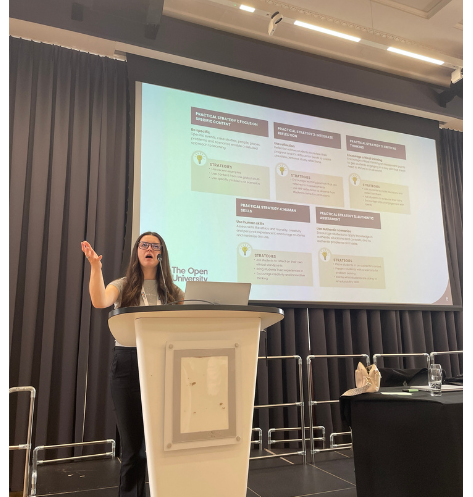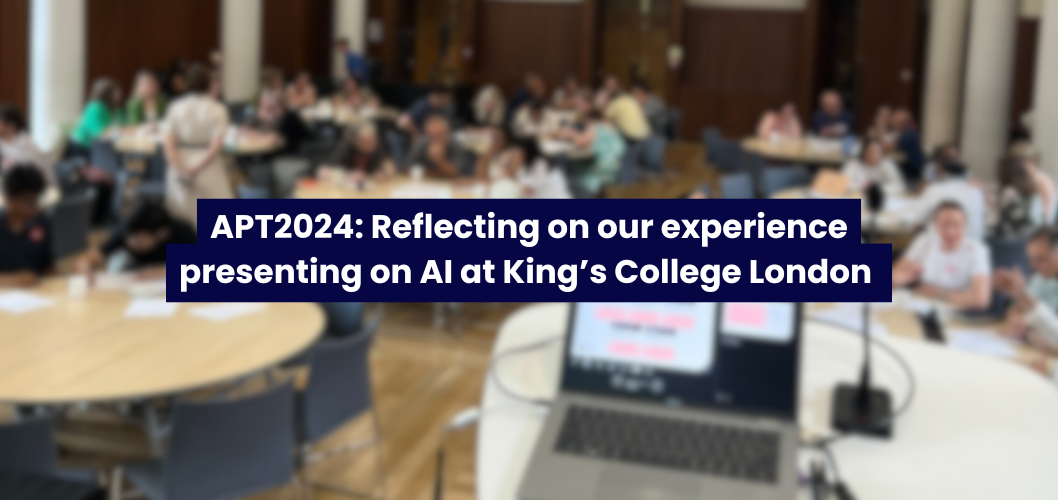Katia Shulga and Mary Simper ~ Learning Designers
This summer we had the pleasure of delivering two presentations at the annual APT conference at King’s College London on behalf of the Learning Design Team at The Open University, UK. It was a hot June day when Mary and I met at the train station in Blackfriars, coffees in hand, ready for the stroll to the conference. King’s College has the enviable location of being right on the river Thames, so the walk among the leafy trees on one side and the river on the other was a perfect way to ready ourselves for the day.
Sharing our knowledge
As we entered the Grand Hall where the conference was held, Mary whispered: “I hope I’m not speaking in here!”. It felt intimidating being in person after so many years of presenting online to little squares on the screen from the comfort of our homes. Luckily, everyone turned out to be curious, friendly and genuinely excited to share knowledge and experience of AI. There was a real diversity of people in the room, from academics to students to learning technologists, all fascinated with what AI means in the higher education context.

We delivered our first talk on the work that we, as Learning Designers, have been doing at the OU around AI. You can view the slides from our talk here: The impact of GenAI on the production of online distance learning. This talk was about the methodology that we stumbled upon whilst reacting to the challenge that ChatGPT posed. The next talk, inevitably, took place in the Grand Hall and was a workshop on how to adapt assessment: Adapting assessment in HE in response to Generative AI. It was a busy room and Mary handled it expertly.
Reflecting on what we learned
We attended several talks throughout the day. Here is a summary of the thoughts and ideas that we walked away with:
🎓 Students have a much more nuanced approach to AI than it’s often assumed. They’re rarely uncritical copy and pasters of AI products. A group of Psychology students conducted a research project asking their fellow students about how they interact with AI. They found that students were unsure of how using AI reflected on how they were marked, even if they’re told it’s ok to use it, would this still prejudice teachers against them? They also found that perception that the teaching staff had on Al affected how students viewed it, if their teachers liked it, they felt more confident in using it, if they didn’t, they were less likely to use it. We came away thinking that we need to talk to student more, which is why we conducted a Curriculum Design Student Panel (CDSP) activity in July to hear more about our students thoughts on the subject.
✅ What does it mean to consent to AI? One academic pointed out the obvious, but sometimes forgotten truth, that AI was not designed as an educational tool and is owned by tech companies. It can be used in education, but that was never its primary target. Do we fully know who it is serving, its implications, and thus can we say give informed consent? This is a question that is at the heart of many AI debates and one that doesn’t have a quick and easy answer, yet it’s important to keep it in mind.
🤖 What’s the solution to some of the bigger challenges that AI poses, such as its negative impact on the environment with its large carbon footprint? Or the lack of control over data and protection of copyright etc.? Perhaps local, task-oriented AI bots. Smaller data sets, less carbon footprint, better results and more targeted results. Do we really need an AI that does everything, when we only want it to do one thing well?
🛠️ How can AI support disabled students? One speaker talked about the positive impact that AI can have on disabled student’s learning experience. We saw a student with a declared disability talk about the affordances of AI in their studies. This is a significant area for further investigation and suggests that while Generative AI does come with many challenges, it may also have a role to play in helping us to close awarding gaps and support students from all walks of life.
We all agreed that we don’t have the answers, we’re full of questions, but through collaboration and conversation we’re able to find some way forward in this new AI infused educational landscape. What shone through most of all was how much we all needed each other and how eager we were all to learn from each other. In the face of such disruptive technology, we’re all on an equal footing.
Suffice to say, we ended the day with some good joint reflection, and a pint of cold beer by the Thames!
If you’d like to talk with the Learning Design team at The Open University about any design related support you’d find useful for your organisation or department, whether that’s running a session for you, helping you to use some of the resources we’ve shared via this blog, or simply for a bit of advice, we would love to hear from you. Please contact us at: [email protected].
Banner image: Mary Simper

